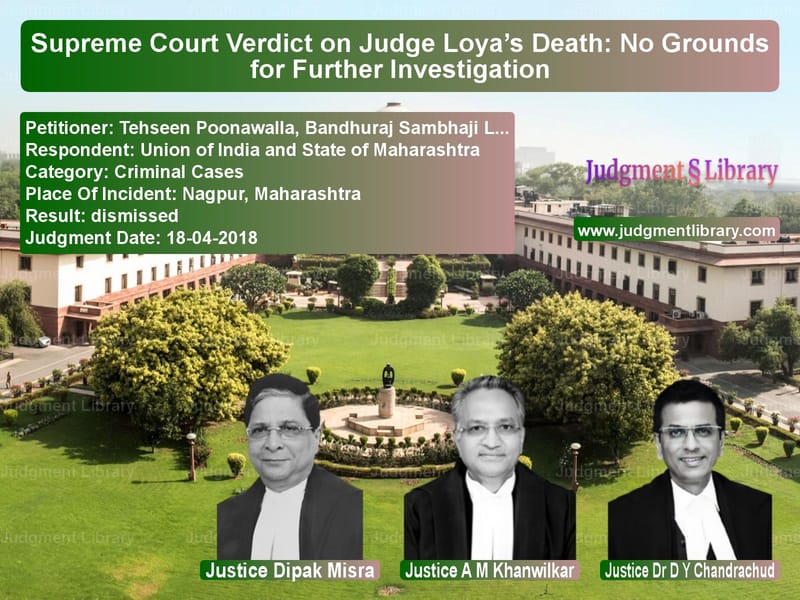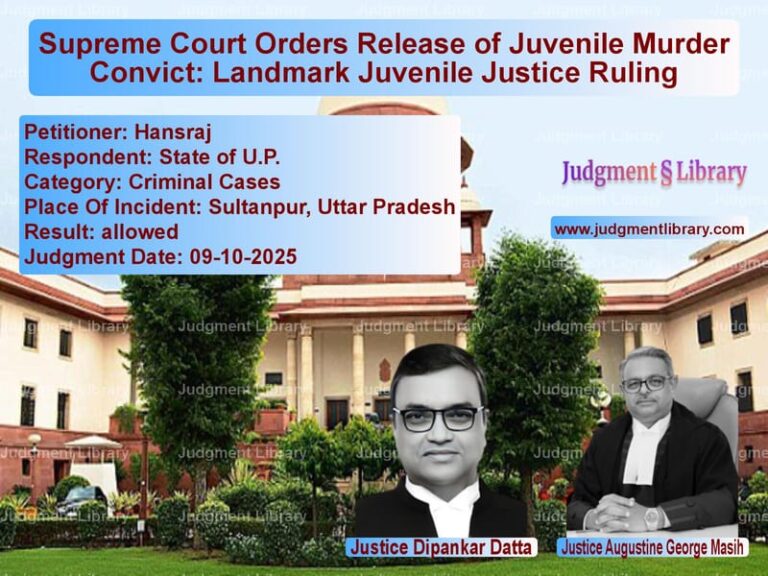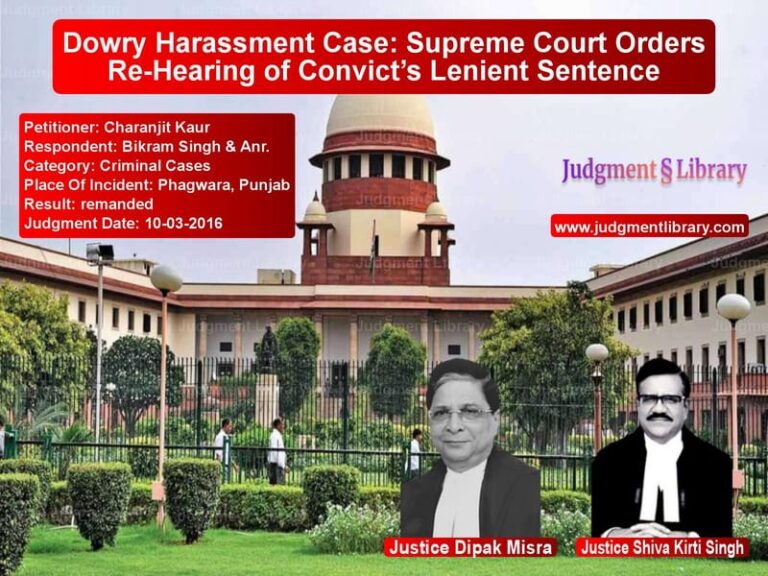Supreme Court Verdict on Judge Loya’s Death: No Grounds for Further Investigation
The Supreme Court of India recently ruled on a set of petitions seeking an independent investigation into the death of Judge Brijgopal Harikishan Loya, who was presiding over the Sohrabuddin Sheikh encounter case. The judgment, delivered on April 19, 2018, dismissed allegations of foul play and concluded that Judge Loya’s death was due to natural causes.
The case became highly publicized after several media reports raised suspicions regarding the circumstances of his death. The petitions alleged that Judge Loya’s demise was suspicious and sought a fresh investigation. However, the Supreme Court, after thoroughly examining medical records, witness testimonies, and reports submitted by the Maharashtra State Intelligence Department, found no grounds for suspicion.
Background of the Case
Judge Loya was the presiding officer in the Special CBI Court in Mumbai, handling the high-profile Sohrabuddin Sheikh encounter case. He passed away on December 1, 2014, in Nagpur, where he had traveled to attend a wedding. His family initially did not raise any concerns regarding his death. However, in November 2017, an investigative report published in Caravan magazine alleged discrepancies in the official account of his demise, leading to public outcry and multiple petitions in the Supreme Court.
Key Facts:
- Judge Loya was handling the high-profile trial related to the Sohrabuddin Sheikh encounter case.
- On the night of November 30, 2014, he suffered chest pain and was taken to Dande Hospital in Nagpur.
- Due to worsening symptoms, he was shifted to Meditrina Hospital, where he was declared dead due to a cardiac arrest.
- The Maharashtra State Intelligence Department conducted an internal inquiry and found no foul play.
- In November 2017, reports surfaced alleging inconsistencies in witness accounts, leading to petitions seeking an independent probe.
Petitioner’s Arguments
The petitioners included Tehseen Poonawalla, Bombay Lawyers Association, and Jayshri Laxmanrao Patil. They presented the following arguments:
- There were discrepancies in the medical records related to Judge Loya’s cause of death.
- Security arrangements for Judge Loya had been withdrawn shortly before his demise, making him vulnerable.
- Family members had allegedly expressed concerns over external pressure before retracting their statements.
- The judge was allegedly offered a bribe of Rs. 100 crore to issue a favorable ruling in the Sohrabuddin Sheikh case.
- The Maharashtra government’s refusal to order an independent probe raised further doubts.
Respondent’s Arguments
The respondents, including the Union of India and the State of Maharashtra, contended:
- There was no evidence of foul play as alleged by the petitioners.
- Four judicial officers—Justices Shrikant Kulkarni, Vijaykumar Barde, Ramesh G. Dube, and Swapna Joshi—who were with Judge Loya in Nagpur provided consistent testimonies.
- Medical records confirmed a heart attack as the cause of death, with no signs of poisoning.
- A discreet inquiry conducted by the Maharashtra State Intelligence Department found no basis for an independent investigation.
- The Supreme Court should not intervene in matters driven by political motivations.
Supreme Court’s Observations
The Supreme Court examined the evidence thoroughly and made the following key observations:
- “The documentary material on record indicates that the death of Judge Loya was due to natural causes. There is no ground for the court to hold that there was a reasonable suspicion about the cause or circumstances of death which would merit a further inquiry.”
- “The statements of the four judicial officers who were with Judge Loya at the time are clear, consistent, and credible.”
- “There is no contradiction between the post-mortem report and eyewitness accounts.”
- “The claim that Judge Loya was offered a bribe remains unsubstantiated and cannot be used to demand an investigation.”
- “A judicial officer’s demise should not be exploited to tarnish the image of the judiciary without substantial proof.”
Key Legal Precedents Considered
- K.V. Raghavan v. Union of India (1996) – Established that speculative allegations cannot be grounds for an independent investigation.
- People’s Union for Civil Liberties v. State of Maharashtra (2009) – Stressed the need for substantive evidence before launching a judicial inquiry.
- Ram Jethmalani v. Union of India (2011) – Reaffirmed that political motivations should not dictate judicial interventions.
Final Judgment
The Supreme Court dismissed the petitions, ruling that:
“The judicial conscience of this Court is not satisfied that there is a reasonable suspicion that would justify an independent inquiry into Judge Loya’s death. The material on record overwhelmingly suggests that the judge died of natural causes, and no case is made out for further investigation.”
The Court further cautioned against politically motivated attempts to undermine public confidence in the judiciary.
Significance of the Judgment
The Supreme Court’s ruling sets an important precedent:
- Ensures Judicial Integrity: The ruling prevents frivolous claims from influencing judicial proceedings.
- Maintains Trust in Institutional Investigations: Confirms that state-led inquiries, when conducted properly, do not require external interventions.
- Prevents Political Misuse of Legal Mechanisms: The judgment underscores that courts should not be used as platforms for politically driven cases.
Conclusion
The Supreme Court’s ruling in the Judge Loya case reinforces the principle that investigations should be driven by concrete evidence rather than speculation. By dismissing the petitions, the Court reaffirmed its commitment to judicial independence and institutional integrity.
Petitioner Name: Tehseen Poonawalla, Bandhuraj Sambhaji Lone, Bombay Lawyers Association, Jayshri Laxmanrao Patil.Respondent Name: Union of India and State of Maharashtra.Judgment By: Justice Dipak Misra, Justice A M Khanwilkar, Justice Dr D Y Chandrachud.Place Of Incident: Nagpur, Maharashtra.Judgment Date: 18-04-2018.
Don’t miss out on the full details! Download the complete judgment in PDF format below and gain valuable insights instantly!
Download Judgment: Tehseen Poonawalla, vs Union of India and S Supreme Court of India Judgment Dated 18-04-2018.pdf
Direct Downlaod Judgment: Direct downlaod this Judgment
See all petitions in Public Interest Litigation
See all petitions in Constitution Interpretation
See all petitions in Separation of Powers
See all petitions in Judgment by Dipak Misra
See all petitions in Judgment by A M Khanwilkar
See all petitions in Judgment by Dhananjaya Y Chandrachud
See all petitions in dismissed
See all petitions in supreme court of India judgments April 2018
See all petitions in 2018 judgments
See all posts in Criminal Cases Category
See all allowed petitions in Criminal Cases Category
See all Dismissed petitions in Criminal Cases Category
See all partially allowed petitions in Criminal Cases Category







